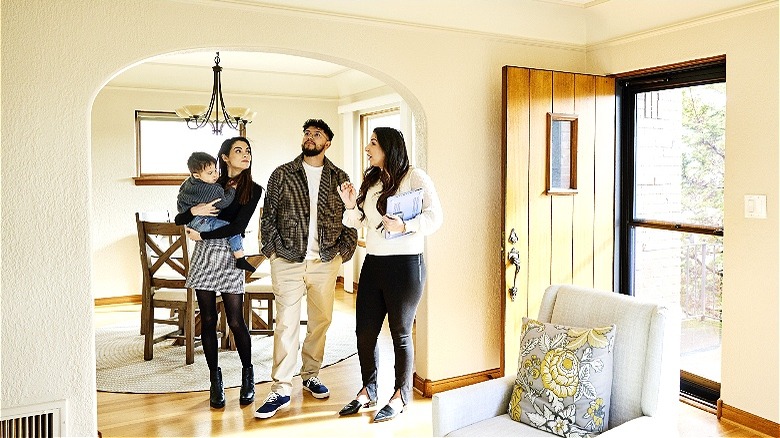This Housing Decision Could Prove Costly For Newlyweds. Here's Why
Navigating the U.S. housing market can be confusing and frustrating. From recent changes in the National Association of Realtors' rules to historically high interest rates, finding your dream home can be a lot of work. Not to mention, housing prices across the country have surged 54% since 2019, making affordability more difficult than ever. While the debate over whether renting or owning can help people build more wealth gets murkier with every year, the appeal of homeownership remains significant for many, especially for newlyweds. While more traditional convention might include newlyweds buying a home, it's increasingly better to wait before purchasing.
Bestselling author and finance expert Rachel Cruze explained in Southern Bride that newlyweds should "enjoy being married without a mortgage payment and all the maintenance headaches." She added, "This time next year, as long as you are out of debt and have at least a 10% down payment, then house hunt to your heart's content." While this advice should be taken with a significant grain of salt, ensuring you and your spouse have a solid understanding of the housing market (as well as of the ongoing financial requirements of homeownership) can be a key way to prepare for eventual homeownership.
Given the complicated nature of not only finding the right home but also financing and maintaining it, rushing in is definitely not the right approach. Plus, taking the time to ensure you and your spouse are on the same age about your requirements for a home can ensure you don't end up making a large purchase you'll eventually regret.
Financial considerations for newlyweds
While chances are high you already lived with your spouse before getting married (more on that later), there are still some financial changes you might decide to move forward with post-nuptials. For starters, joint bank accounts and/or credit cards could be a priority if you didn't already join your finances pre-marriage. Similarly, while you might have split the rent, having a deeper conversation about you and your partner's credit scores and existing debts can be important, not just for your finances, but especially if you're considering buying a home.
Both your debt ratio and your credit scores can significantly impact your loan applications when trying to finance the purchase of a home. Understanding any long-term debts (such as car loans or student loans) as well as any recurring debts (i.e., credit cards) can allow you as a newly married couple to make a better financial plan for the future.
In addition to financial planning, having a conversation on what specific things you want from a home can also be part of a larger discussion on your future. For instance, having a backyard if you would like to get dogs or even additional bedrooms for future kids and/or for family to visit. Another consideration would be if you'd like to supplement your income with an accessory dwelling unit or Airbnb-style addition on your home. Having a solid understanding of what you'd both like out of a property can be crucial before you ever begin your search (not to mention help you avoid some common first-time homebuyer mistakes).
Changing traditions in America
It's also worth mentioning that the concept of newlywed homebuyers has become an increasingly out-of-date one. This is largely due to how relationships have changed over time, especially societal norms around cohabitation. According to a Pew Research Center survey, 78% of people aged 18-29 support the idea of an unmarried couple living together even if they don't plan on getting married (not to mention the growth of DINKs). This marks a noticeable shift from older generations as well as more conservative traditions that tend to maintain a stricter view of cohabitation after marriage.
Another important factor is finances. Thirty-eight percent of Pew's survey respondents reported that finances influenced their decision to move in with their partner. Another 37%, meanwhile, referenced convenience as a deciding factor. With rental prices up 19% nationally since 2019, it's no wonder that many couples end up cohabiting long before they ever consider getting married. All of this is to say that the idea that a couple only just begins to live together after they've gotten married is increasingly less common.
Already living together with your partner means that balancing finances, determining household chores, and discussing what you might want in a future house are all conversations you more than likely have already had. Waiting a year post-nuptials to buy a house is predicated on the idea that you might not already know the more intimate daily aspects of your new spouse. For couples who have already been living together, finding the right house comes down to what works best for you both, whenever that might be.


